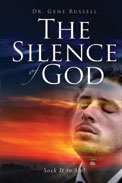
 |
Despite the cruel hardships that many people experience and which author Russell enumerates based on the personal accounts of those he has met and pastored, we must accept that God listens and answers, even when he is silent. To take on the significant spiritual question of why a loving, omniscient, and omnipresent deity so often feel so far away from those who believe in him, preacher and businessman Russell draws on both historical record and real-life stories. Perceptions of God’s presence or lack of it can vary greatly. As Russell points out, one person might feel that they have been unfairly targeted by God for suffering, while another might wonder why they have been so greatly blessed. To grasp the explanation of God's silence, the author states that one must first accept that God is real. Though we cannot perceive Him with our ordinary human senses, we may have a feeling of God watching over us at crucial times. In dry periods, those who believe in God must subsist on faith and welcome his silence—hence the book’s subtitle.
The author offers the biblical accounts of miracles as corroboration of God’s care, along with the modern scientific construct of the “intelligent design” of the universe. Based on his own understanding, Russell postulates what he calls "marks on steel" or absolute truths: 1. He could not do anything on his own; 2. He could only succeed with God's help; 3. He must, therefore, be "expectant" of God's help.
Russell states he felt called to write this book because of his own dry spells and his observations of the difficult challenges faced by those in his circle of influence. Even as a Christian pastor, he suffered the pangs of loneliness and longing that come to all of us when life's storms are almost too harsh to bear, and there seem to be no signs of comfort or counsel from that being we call God. Russell resolved to address this issue in a way that might be accessible to all, no matter what their professed belief system.
He writes in a manner that is both scholarly, with footnotes, and personal, accessible, using modern vernacular. Though he fairly and frequently presents the viewpoint of those whose beliefs do not match his own, he writes from a securely Christian perspective. "The Bible," he states, "is the only book that tells us of the true God." He has many examples of the ways that we humans may feel abandoned, confused or stymied. These can be as simple as being unemployed to extremes of illness and abuse. He does not shy away from using these personal histories, though he does not suggest remedies beyond the model of "marks on steel."
His thesis is compelling, and his arguments are cogent: God can't give us totally free will without letting us commit evil actions; sometimes bad things work to the good, such as Beethoven's deafness; and even those to whom God spoke, such as Noah, were then left to do His work for years on end without any further communication. Russell’s book presents classic ideas in a current, honest way that will appeal to many in his faith group. His book would also make an excellent study guide.
RECOMMENDED by the US Review